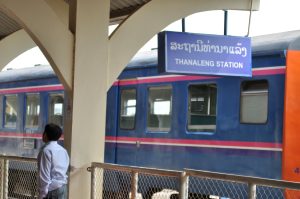Human rights groups are calling for Laos to release a Chinese lawyer who has been in custody since late last week and could soon face deportation to China.
Lu Siwei, who lost his license to practice law in 2021 after speaking out about the cases of 12 Hong Kong activists, was arrested in the Lao capital, Vientiane, on July 28 as he was boarding a train for Thailand, the Associated Press reported earlier this week. He was reportedly traveling to Bangkok to take a flight to the United States, where he planned to reunite with his wife and daughter.
In a statement yesterday, the organization Front Line Defenders said that Lu has since been transferred to a Department of Immigration facility, “which strongly suggests he is facing imminent deportation.” Another report stated that Chinese Embassy staff were present at the facility on his arrival.
Front Line Defenders said that it was “deeply concerned about the detention of human rights lawyer Lu Siwei and the possibility of his imminent deportation.” If he is returned to China, it added, Lu “is likely to face reprisals, including arbitrary detention and prosecution, as a result of his human rights work.” Amnesty International similarly said that Lu “must be immediately and unconditionally released.”
Lu’s wife Zhang Chunxiao has also called for his release. “I’m extremely worried for his safety,” she said in a text message sent to the AP. “If he’s sent back to China, he’d definitely be imprisoned.”
According to the AP report, Lu has “a history of taking on sensitive cases, and of navigating the fraught and murky waters of defending people who are deemed to be political targets by authorities.” In 2021, Lu was barred from leaving China for a visiting fellowship in the United States and was told he had an exit ban placed on him.
According to Safeguard Defenders, another rights organization, Lu and two colleagues arrived at the Thanaleng station close to the Thai-Lao Friendship Bridge that divides the two countries, at around 8:35 a.m. to buy tickets for the 10 a.m. train over the border. Local police then confiscated the passports of Lu and one of the others, before handcuffing Lu, who was then forced into a car and driven away.
“As a friend, I stepped in and asked what the issue was and that I wanted to go with him since we were friends and travel companions,” one of Lu’s companions recalled. “Ultimately there were 10 or more immigration officials there and they forcibly held me back and pushed/pulled me away from him while others pushed Lu into the car. The car sped off with him inside a bit after 11:10.”
For years, Laos has been a primary route for people fleeing China, from dissident intellectuals and rights activists to Uyghur Muslims fleeing repression in China’s Xinjiang region, usually with the ultimate aim of reaching Thailand – a relative sanctuary in mainland Southeast Asia. But that route has become increasingly perilous as relations between China and Laos have become closer, abetted by increased economic integration and the flows of capital and immigration that have resulted. The advent of military and military-backed rule in Thailand has also made the country less hospitable to dissidents from across the region.
While Lu’s arrest reflects the unusually close relationship between Beijing and Vientiane, as a phenomenon it is sadly far from unusual. Recent years have seen an increased trend of authoritarian collaboration in the arrest of dissenters and political activists seeking sanctuary across borders in mainland Southeast Asia, whether by “host country” police or by forced renditions, such as in the recent “disappearances” of Thai democracy activist Wanchalearm Satsaksit in Cambodia, Vietnamese blogger Duong Van Thai in Thailand, and, most recently, Myanmar refugee advocate Thuzar Maung in Malaysia.
The emergence of this mutual security pact has rendered large parts of the region inhospitable terrain for those stepping beyond the bounds of the politically acceptable.

































